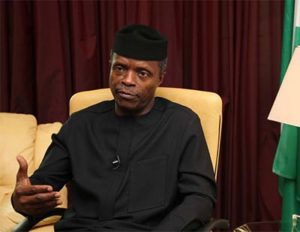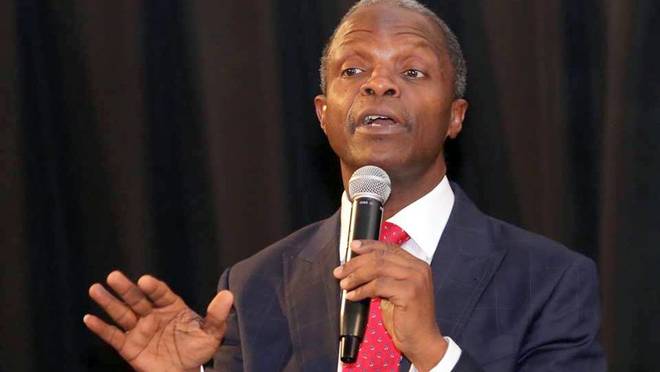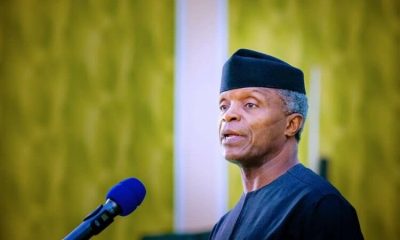News
Terrorism: Osinbajo Urges Policies To Tackle Poverty, Illiteracy
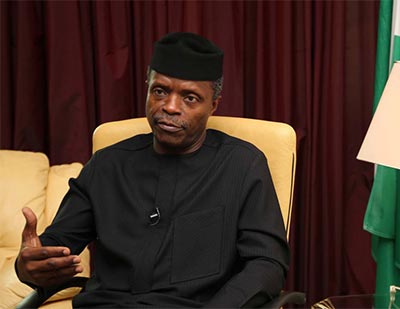
By Johnson Eyiangho, Abuja
Vice President Yemi Osinbajo has said that enduring victory against violent extremism and terrorism can only be achieved through implementing policies that comprehensively tackle poverty, illiteracy and frustration.
Osinbajo said that it was those factors that predispose individuals and communities to imbibing extremist beliefs and ideologies.
He made the assertion on Thursday in Abuja, while declaring open the 7th meeting of the Ministers of Defence of the Community of Sahel-Sahara States – CED-SAD.
“Indeed, the military aspect of the fight against terrorism is the short-term one; enduring victory will only come from swiftly and diligently building on military victory by implementing, over the long term, policies that comprehensively tackle the poverty, illiteracy and frustration that predispose individuals and communities to imbibing extremist beliefs and ideologies.
“If there is one thing we have learned from our experience fighting Boko Haram in Nigeria, it is that the battle is as much social and economic as it is a military one.
“But the narrative is worsened by the fact that violent extremism and terrorism do not walk alone, they are usually to be found interlinked with human trafficking, drug trafficking, illicit trade in drugs and arms, and various other forms of transnational organized crimes,’’ he said.
The vice president said that within the community, security challenge had assumed new dimensions since the Arab Spring, with the collapse of the Gaddafi regime in Libya, proving to be a watershed moment.
According to him, countries like Mali, Burkina Faso, Niger and Nigeria have since then experienced an escalation of the twin global threats of violent extremism and terrorism, among others.
The escalation of threats and vulnerabilities in the region, he said, had became an immediate and urgent security threat to the community.
He, however, said that it was encouraging that significant progress had been made to contain the terrorist challenges through the individual and collective actions.
Osinbajo also noted that other elements that fuel violent extremism and terrorism were ecological threats of desertification and drought, as well as the phenomenon of forced human migration, among others.
“Africa has historically been susceptible to desertification due to the preponderance of semi-arid, arid and hyper-arid lands.
“Climate change and other factors collectively exacerbate these natural geographical conditions to make more than 319 million hectares of Africa vulnerable to desertification.
“In the CEN-SAD Community, the Sahara desert is advancing southwards at an alarming rate of approximately 600 meters annually,’’ he added.
Osinbajo urged leaders in the community to promote agreements and partnerships that “will enable the Community fully bridge our development gaps, and meet the rapidly growing needs of present and future generations.’’.
He added, “It is certainly in our collective interest to act proactively in this regard, by enabling and catalysing the jobs and prosperity without which these battles cannot be lastingly won.’’
Earlier, the Minister of Defence, Mansur Dan-Ali said that the security climate in the Sahel-Saharan States “is characterised by several internal threats and a lineage of organised cross-border crimes.’’
He said that those threats posed challenge to internal security and stability of the states and the region generally.
The minister, however, said that cooperation and collaboration by members’ states in the fight against insurgency and terrorism had yielded positive results.
“For instance, the Multi-National Joint Task Force (MNJTF) comprising of troops from Benin, Cameroon, Chad, Niger and Nigeria, operating in the Lake Chad region against Boko Haram insurgency in collaboration with Nigeria’s Operation Lafia Dole forces have significantly degraded the Boko Haram terrorists,’’ he said. (NAN)
-
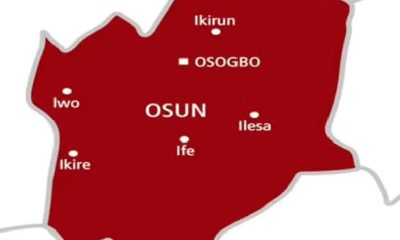
 Opinion5 days ago
Opinion5 days agoThe Clout-chasing Dipo Awojide By Comrade Da’Peace
-

 News4 days ago
News4 days agoRamadan, Lent: Shettima Calls For National Unity And Compassion
-

 Opinion4 days ago
Opinion4 days agoReinventing Osun’s Economy Through Dagbolu Intl. Trade Centre: From Quiet Market Lessons To Regional Trade Revolution By Adeboye Adebayo
-

 News4 days ago
News4 days ago‘Wike Factor’: Another PDP Chairmanship Candidate Steps Down For APC In FCT


